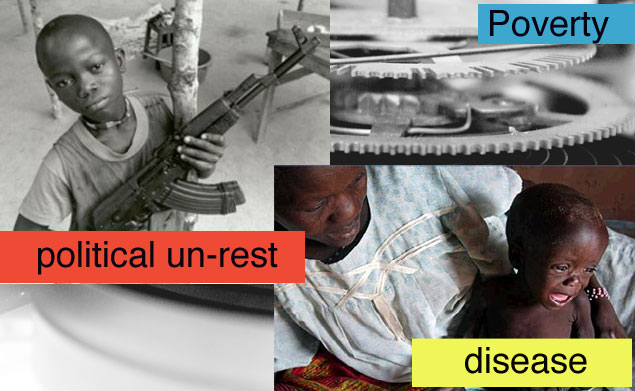During the past 4 decades, the western world continuously strove to build the quintessential development agencies, programs, initiatives and financial systems to meet their ultimate goal of eradicating poverty. Or even further, they focused on meeting the hefty, ambitious United Nations Millennium Development goals; “to eradicate poverty, promote human dignity and equality and achieve peace, democracy and environmental sustainability” by the year 2015. From this has grown a machine, and it’s a big one. A machine born outside the territories of the “under-developed” regions it so aims to cure of calamities plaguing the so called 3rd world – poverty, political un-rest, conflict, war, famine, disease, their list goes on. This machine is called development- development work, development studies, and development theories. The machine has been defined, built, maintained and sustained by a side of the world which as we’re taught, told and shown, has all the answers to gaining economic prosperity, social and political justice and of course the over-arching magical cure to all – “democracy”. In 2010 alone, an estimated $129 billion of aid was pumped into the development machine with needless to say bleak and many times detrimental results. Popular sentiments on the issues of development aid and why it hasn’t been as successful as ‘anticipated’ tend to center around criticisms that excessive amounts of money from donor nations go to corrupt governments who mismanage the funds intended for their citizens. That’s just too easy.
The real problem is that since its inception, the efforts of the “development machine” in Africa and its Diaspora are primarily focused on external efforts based upon western systems and strategies. This in essence makes them neither relevant nor impactful towards the long term development of Africa and African Diaspora nations. When you take a close look, you’ll see that a large number of the programs, projects, theories and sometimes even organizations themselves inherently lack short term quantitative and qualitative milestones. Which, if were to be coupled with true transparency, could be carefully tracked and analyzed to measure their efficiency and ensure meaningful, sustainable results.
Natural Stirrings at the Grassroots: Development, Doctrine, and the Dignity Principle’–Anna C. Vakil, -‘
The above document by Anna C. Vakil argues that in order for members of any society to experience development by obtaining access to some of the most basic amenities needed for quality living such as food, housing, education, and health institutions, it has got to be home-grown. They must be, in some way or another, economically empowered at the grassroots level. By not providing access to economic freedom, any means to elevate standards of living are stripped away from people and their communities; therefore perpetuating what I like to call “economism” i.e. the vicious cycle of poverty through economic disenfranchisement which is the true, core calamity plaguing developing countries today. “Economism” has numerous effects: poverty and hunger, lack of functioning educational systems, gender inequality, child health issues, maternal health issues, widespread disease such as HIV/AIDS, lack of environmental sustainability, and global exploitation instead of global partnership. For those who caught it, yes I just listed the reverse of the eight United Nations Millennium Development Goals which by the way, the world has 3 years, 3.5 months to reach-but let’s not even go there. My point is that yes, the problems we face are real; and yes developmental goals are merited but the approach and pretentious manner of the development machine is extremely flawed.
As Anna C. Vakil wrote: “Progress in the development field will largely depend on natural stirrings at the grassroots, and it should receive its driving force from those sources rather than from an imposition of plans and programs from the top”
There is urgency for a major shift in the rationale of development practice and studies and maybe even a name change to something cliché like-Empowerment Studies, or ‘power to the people’. Then, provide more focus and energies towards grassroots initiatives that have greater emphasis on small business development and entrepreneurial training to promote social entrepreneurship. This is already being done by some with amazing, inspiring results, providing various levels of economic freedom, so the wheel doesn’t necessarily need to be re-invented. So that tells me that such should be done on a larger scale and be seen more as one of the keys to reaching developmental goals rather than as a side note to the powerful, not to mention rich, machine “development” has grown into. Any initiatives enacted by any developmental organizations, large or small, should have not just one but both of these foundational principles: (1) a tight grasp on the economic, social, cultural and political characteristics of the society and (2) an efficient use of the society’s resources such that the members of the community are indeed the primary beneficiaries from them, not outsiders.
Tackling the issues of the extremely problematic and detrimental disparities in wealth between the west, Africa and its Diaspora is a heavy feat. It is a daunting task which requires first and foremost delving critically into the (a) economical (b) political (c) social and (d) cultural underwritings and implications of our complex and intertwined history. But, most importantly it imperative in order to stall history from repeating itself in the form of neo-colonization and harsh exploitation of resources, and the will prove nearly impossible. I say stall because well, quite frankly this reality is already happening and in my humble opinion I’m not sure if we’ve all noticed yet. Do we get the big picture? And are the right provisions being made to ensure that the Continent and its Diaspora, for lack of a better phrase, continue to “get played”? This isn’t breaking news, but at the end of the day, a stark and sad reality is that the economic advancement of Africa and its Diaspora just doesn’t benefit the current outlined economic interests of the western world. So while it’s important to trace our social and cultural orijins, let’s also make sure not to forget to trace our economic orijins as well so that we may be included in the critical dialogue of how to define our own development.
Latest posts by Gnima (see all)
- A BIG, Broken Machine: “Development” in Africa - September 19, 2011




